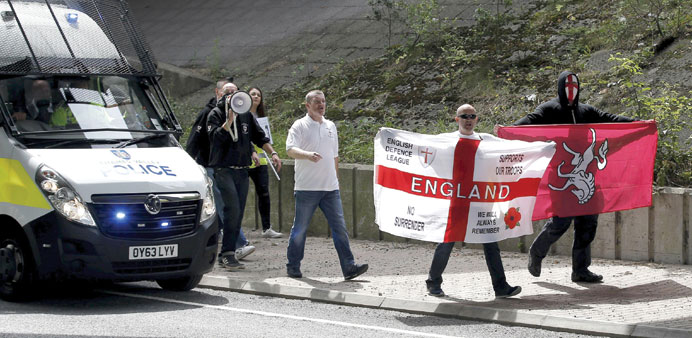English nationalists take part in a counter-protest aimed at protesters demonstrating in solidarity of migrants in Calais, in Folkestone, Britain yesterday. The protesters are urging Eurotunnel to to take greater precautions to help prevent further deaths of those attempting to enter Britain. PICTURE: REUTERS/Peter Nicholls
Agencies/London
Rival protests featuring those welcoming migrants and far-right wingers opposed to their presence were held in the British port town at the mouth of the Channel Tunnel yesterday.
Small groups gathered in Folkestone, southeast England, with around 20 people in support of the migrants, while about 30 others turned out to protest against immigration.
“We are here to make it clear to the migrants that many people here would welcome them and that the way they are being treated is not in our name,” said Bridget Chapman, organiser of the pro-migrant demo.
Nearby right-wingers chanted: “Britain first, taking our country back”.
“British people don’t want immigration,” said Paul Goding, leader of the Britain First party. “We are a small overcrowded island. We haven›t got enough space for our own people, let alone a torrent of mass immigration into this country”.
On Monday night, migrants on the French side of the Channel Tunnel in Calais made more than 2,000 attempts to enter the Eurotunnel terminal, the peak of recent disruption.
French police said Saturday some 300 migrants in Calais attempted to reach Britain overnight, a significant drop as the security presence has been beefed up.
For the hundreds of migrants who make it across the English Channel, a stark detention centre in a former fortress overlooking the sea often represents the bitter end of a long journey.
Recent arrivals have been bussed in to the Dover Immigration Removal Centre, a former citadel which looms above the port and is surrounded by a moat, high fencing, barbed wire and security cameras.
The prison-like building houses up to 316 adult men who have either applied for asylum or had their applications rejected, although the exact numbers of daily departures and arrivals are kept secret.
As well as adults, hundreds of those making it by ferry or train hidden among freight are unaccompanied youngsters and the local authority says it is overwhelmed by the recent surge in child numbers.
«We have no more capacity to take many more in the coming weeks if the increase in numbers continues as in the past few weeks,» said Paul Carter, leader of the Kent County Council, which is asking the British government to help with the recent influx.
The number of asylum seekers under the age of 18 in their care has almost doubled to 605 in the last three months, leaving the council with a £5.5mn shortfall.
Compass Fostering, which finds homes for youngsters, said it had seen a five-fold increase in the numbers of unaccompanied children arriving as asylum seekers.
A year ago it was receiving 34 referrals from local authorities per month — a figure now at 140. They are mainly boys, some as young as 12.
A source close to the matter told AFP that “over 100” migrants were detained after arriving by freight train on a single day this week, compared to numbers of “zero to a handful” before the crisis escalated.
Reaching the port of Dover or the train terminal in Folkestone, on England›s southeast tip, is the aim for migrants camped out in the French town of Calais, 34km away across the Channel.
An AFP photographer in the early hours of Friday saw two migrants clinging to the roof of one truck leaving the Eurotunnel terminus, having made the journey on the freight shuttle from Calais.
The migrant crisis in Calais has spiked in recent days, with upwards of 2,000 desperate nightly bids to sneak into the undersea tunnel, and the governments on both sides pledging tougher action.
Unless they vanish off the radar, adult migrants can face lengthy periods of detention while their asylum or refugee cases are assessed — with many sent back home or to their European country of arrival.
Volunteers who work with new arrivals say they are often battered by their experiences and in no position to present their case to the British authorities.
“Most of the time these people are completely traumatised,” said Raga Gibreel, who works to support compatriots arriving from Sudan and South Sudan.
“They arrive in a different country with a different culture and language. They have lost friends and relatives in the Mediterranean,” she told AFP in Dover.
“Sometimes you find people with marks on their bodies from lashes, cuts, or bullets”.
Gibreel helps her compatriots establish local support networks and navigate the procedures they need to go through.
Some would-be immigrants might envision Britain as a place of sanctuary and opportunities for education and well-paid work — though this is not necessarily how the perilous journey will end.
The Kent Refugee Help charity assists detainees in the Dover Immigration Removal Centre in finding legal representation.
According to caseworker Pete Keenan, Britain’s immigration system “effectively persecutes” asylum claimants by creating bureaucratic hurdles.
“It’s antagonistic and it’s trying to make them break and just give in and to go back to whatever they’ve fled from in the first place,” he told AFP.
“From bottom to top there is a culture of disbelief and you’ve only got to slip up technically in one area and you’re banging nails into your own coffin”.

